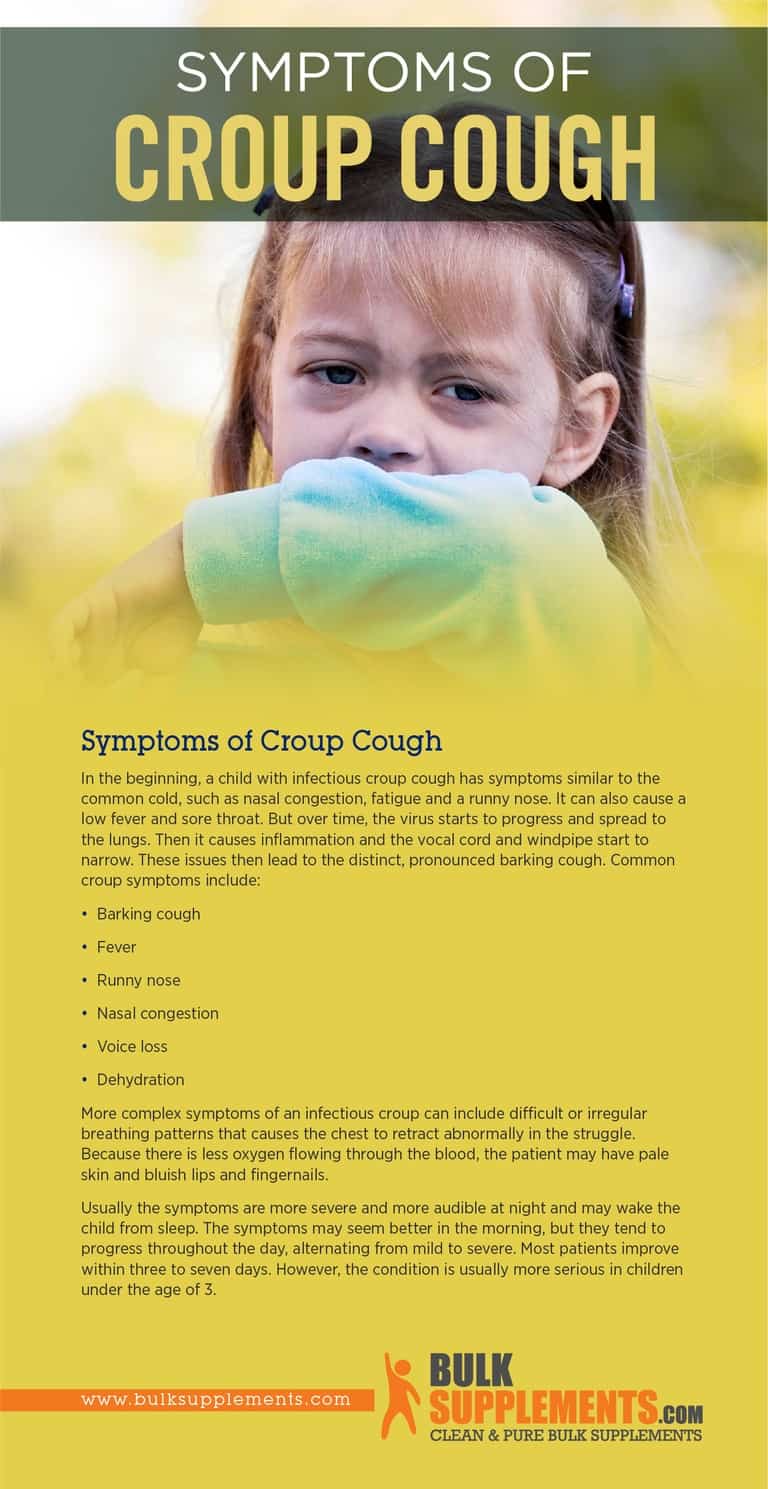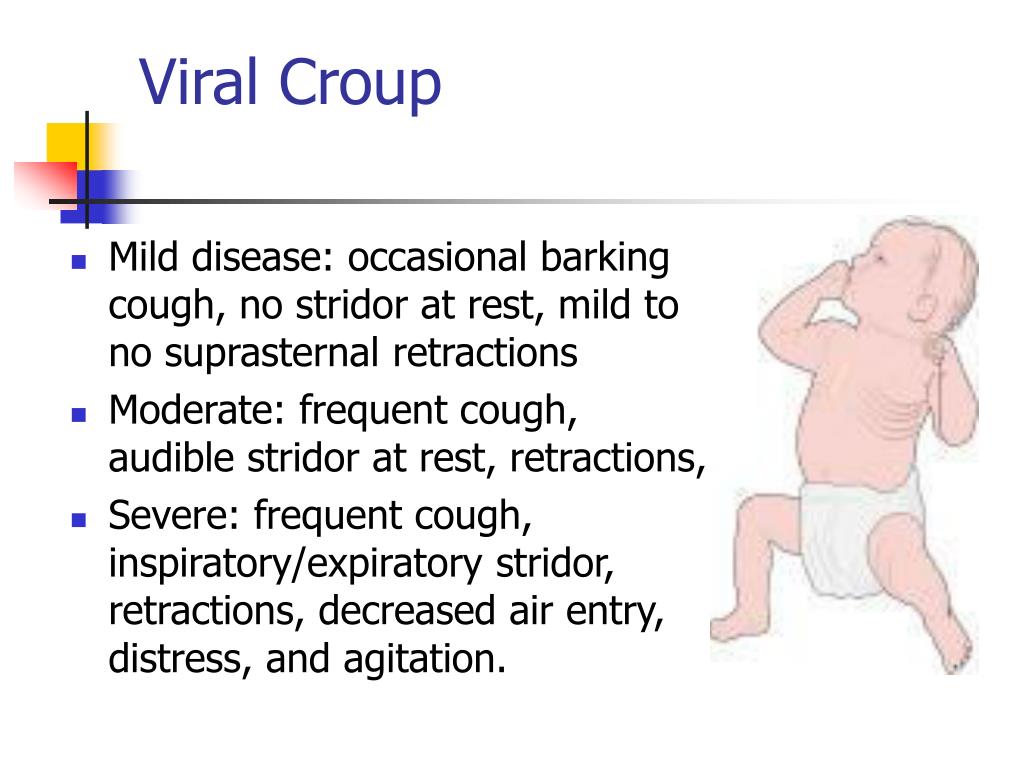
 If age 6 years or older, you might decide to use a cough medicine. Caution: do not use honey until 1 year old. Honey has been shown to work better for coughs. Reason: no proven benefit for children and not approved under 6 years old (FDA). Non-prescription cough medicines are not advised. If you don't have any, you can use hard candy. Age 6 years and older: use Cough Drops to decrease the tickle in the throat. If you don't have any honey, you can use corn syrup. It can thin the secretions and loosen the cough. Age 1 year and older: use Honey ½ to 1 teaspoon (2-5 mL) as needed. Amount: use a dose of 1-2 teaspoons (5-10 mL). Age 6 months to 1 year: give warm clear fluids to treat the cough. Goal: decrease the irritation or tickle in the throat that causes a dry cough. If the air in your home is dry, use a humidifier. Calm Your Child if He or She has Stridor:. You can also go outside with your child if the weather is cold. If warm mist fails, breathe cool air by standing near an open refrigerator. Caution: do not use very hot water or steam which could cause burns. You could also use a wet washcloth held near the face. Breathe warm mist in a closed bathroom with the hot shower running. First Aid for Stridor (Harsh sound with breathing in):. Here is some care advice that should help. We want to help a productive cough, not turn it off. It helps protect the lungs from pneumonia. Stridor is a loud, harsh sound when breathing in. Some have tight breathing (called stridor). Most children with croup just have a barky cough. Mild croup (barky cough) with no stridor. Croup is a frequent problem (3 or more times). Coughing causes vomiting 3 or more times. You think your child needs to be seen, but the problem is not urgent. Fever returns after being gone more than 24 hours. Age less than 1 year old with a croupy cough. Stridor (harsh sound with breathing in) occurred but not present now. You think your child needs to be seen, and the problem is urgent. Caution: do NOT give your baby any fever medicine before being seen. High-risk child (such as cystic fibrosis or other chronic lung disease). Examples are: sickle cell disease, HIV, cancer, organ transplant, taking oral steroids. Lips or face have turned bluish during coughing. Stridor (harsh sound with breathing in) is heard now. You think your child has a life-threatening emergency. Drooling, spitting or having great trouble swallowing. Croup started suddenly after bee sting, taking a new medicine or allergic food. Lips or face are bluish when not coughing. Severe trouble breathing (struggling for each breath, constant severe stridor). This can be life-threatening (anaphylaxis). Croup symptoms can also be caused by a food allergy. Suspect when there is a sudden onset of coughing and choking. Examples are powdered sugar, flour dust or peanut dust. Breathing in any fine substance can trigger 10 minutes of severe coughing. A runny nose, itchy eyes and sneezing are also often present. A croupy cough can occur with exposure to pollens or allergens in a barn. A fever is often present with the barky cough.
If age 6 years or older, you might decide to use a cough medicine. Caution: do not use honey until 1 year old. Honey has been shown to work better for coughs. Reason: no proven benefit for children and not approved under 6 years old (FDA). Non-prescription cough medicines are not advised. If you don't have any, you can use hard candy. Age 6 years and older: use Cough Drops to decrease the tickle in the throat. If you don't have any honey, you can use corn syrup. It can thin the secretions and loosen the cough. Age 1 year and older: use Honey ½ to 1 teaspoon (2-5 mL) as needed. Amount: use a dose of 1-2 teaspoons (5-10 mL). Age 6 months to 1 year: give warm clear fluids to treat the cough. Goal: decrease the irritation or tickle in the throat that causes a dry cough. If the air in your home is dry, use a humidifier. Calm Your Child if He or She has Stridor:. You can also go outside with your child if the weather is cold. If warm mist fails, breathe cool air by standing near an open refrigerator. Caution: do not use very hot water or steam which could cause burns. You could also use a wet washcloth held near the face. Breathe warm mist in a closed bathroom with the hot shower running. First Aid for Stridor (Harsh sound with breathing in):. Here is some care advice that should help. We want to help a productive cough, not turn it off. It helps protect the lungs from pneumonia. Stridor is a loud, harsh sound when breathing in. Some have tight breathing (called stridor). Most children with croup just have a barky cough. Mild croup (barky cough) with no stridor. Croup is a frequent problem (3 or more times). Coughing causes vomiting 3 or more times. You think your child needs to be seen, but the problem is not urgent. Fever returns after being gone more than 24 hours. Age less than 1 year old with a croupy cough. Stridor (harsh sound with breathing in) occurred but not present now. You think your child needs to be seen, and the problem is urgent. Caution: do NOT give your baby any fever medicine before being seen. High-risk child (such as cystic fibrosis or other chronic lung disease). Examples are: sickle cell disease, HIV, cancer, organ transplant, taking oral steroids. Lips or face have turned bluish during coughing. Stridor (harsh sound with breathing in) is heard now. You think your child has a life-threatening emergency. Drooling, spitting or having great trouble swallowing. Croup started suddenly after bee sting, taking a new medicine or allergic food. Lips or face are bluish when not coughing. Severe trouble breathing (struggling for each breath, constant severe stridor). This can be life-threatening (anaphylaxis). Croup symptoms can also be caused by a food allergy. Suspect when there is a sudden onset of coughing and choking. Examples are powdered sugar, flour dust or peanut dust. Breathing in any fine substance can trigger 10 minutes of severe coughing. A runny nose, itchy eyes and sneezing are also often present. A croupy cough can occur with exposure to pollens or allergens in a barn. A fever is often present with the barky cough. 
Many respiratory viruses can infect the vocal cord area and cause narrowing. Viruses are the most common cause of croup symptoms. For any stridor, see First Aid for treatment.Most children with stridor need treatment with a steroid (such as Decadron).All stridor needs to be treated with warm mist.So does stridor at rest (when not crying or coughing). Loud or constant stridor means severe croup.Stridor is a harsh, raspy tight sound best heard with breathing in.Some children with severe croup get a harsh, tight sound while breathing in.The voice or cry is hoarse (called laryngitis).The croupy cough is tight, low-pitched, and barky (like a barking seal).Croup is a viral infection of the voicebox (larynx).

Barky cough and hoarse voice caused by a virus.







 0 kommentar(er)
0 kommentar(er)
